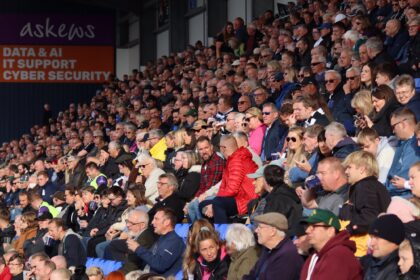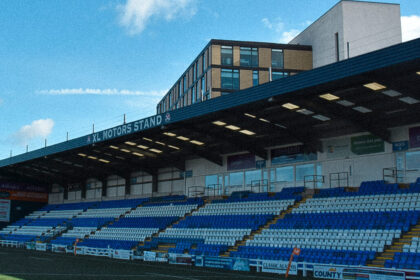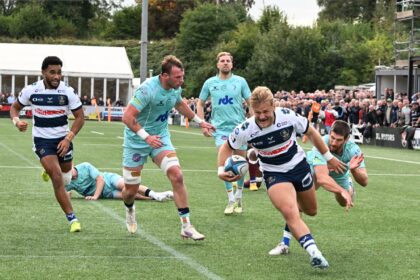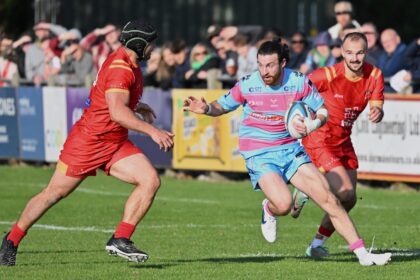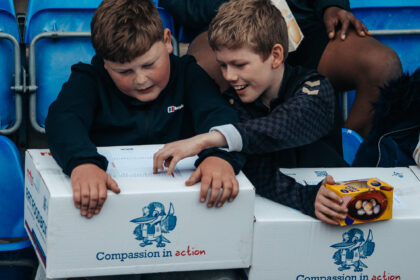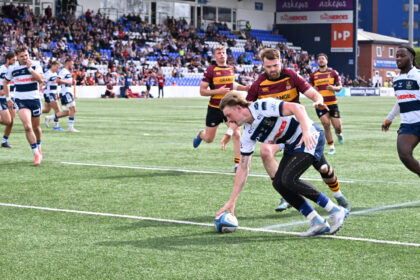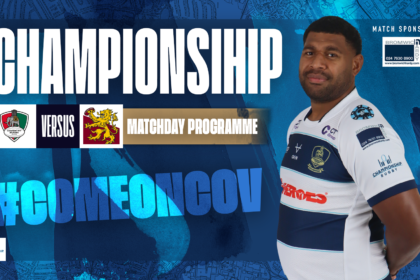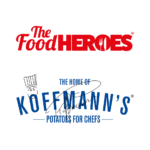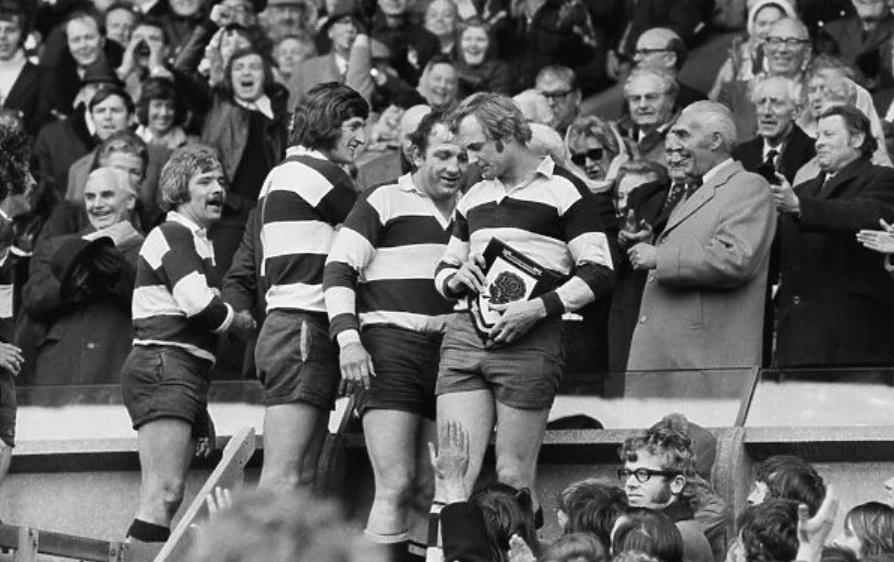
To mark Coventry Rugby’s 150th anniversary year former Coventry Telegraph and Birmingham Mail rugby writer Paul Smith looks back on some of the club’s most memorable matches with the help of those who were there.
The series continues with the April 1974 Twickenham cup final win over London Scottish which kept the RFU Cup at Coundon Road for a second consecutive year.
Putting it in Context
As Cov gear up to face London Scottish in their 150th anniversary season, the turn of the year has also brought the golden jubilee of their meeting with the Exiles in the 1974 cup final.
They were very different times! Coventry’s car industry was the envy of the world and the city’s rugby club wasn’t far behind the Talbot Sunbeam when it came to putting the Three Spires city on the map.
Cov’s amateur squad took time off work to play and train in 50-plus ‘friendlies’ but no league games during a season which (with no exceptions allowed) began on September 1st and ended on April 30th.
On the pitch a try was worth four points while a rugby team consisted of 15 players and should one get injured, as Bristol’s John Pullin had when breaking a leg during Cov’s 1973 cup final win, 14.
A card was what players received by post when called up for England rather than a refereeing kit bag essential. Fighting was part of the game and as a result being sent off was a badge of honour belonging to only a few proper hard nuts.
This was a time when shirt numbering was pretty haphazard. For example, while London Scottish’s full back wore no.15 at Twickenham, Peter Rossborough wore no.1. The opposing hookers wore no.2 and no.9 and most confusingly of all Cov no.8 Les Rolinson wore no.14!
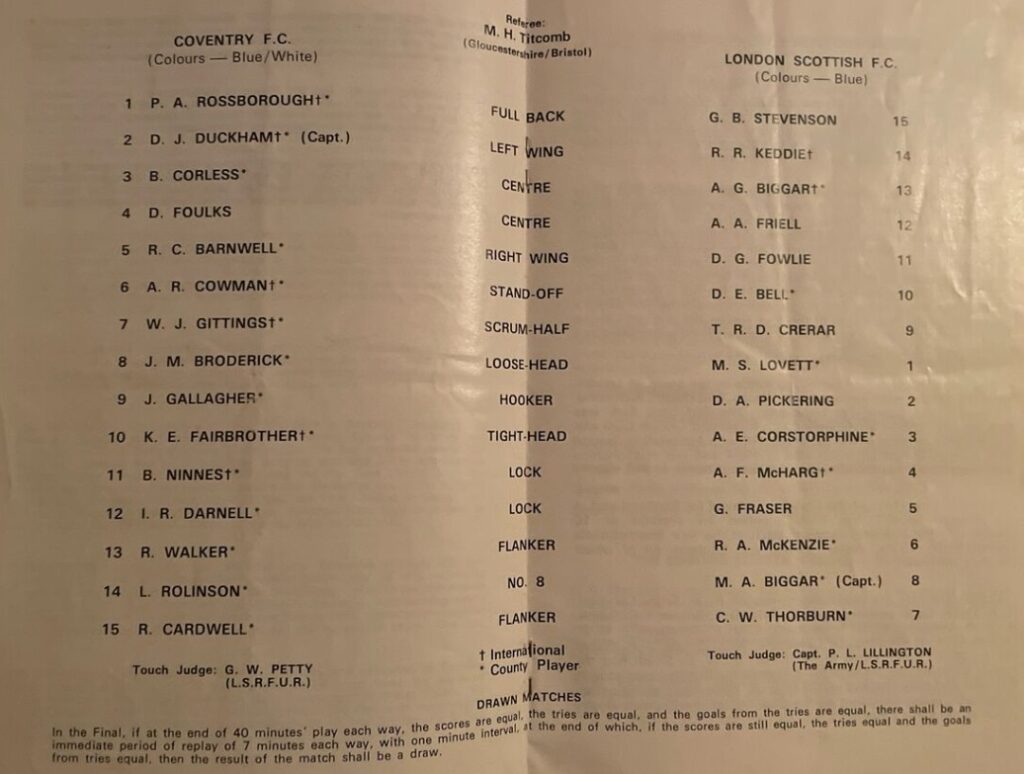
Gloucester won the first iteration of the RFU Cup in 1972 – the strictly amateur status of the sport meant no sponsor’s name was permissible back then.
But such was Coventry’s domination of all-comers in a two-decade long golden era commencing in the mid-1950’s, it was only a question of time until the trophy made its way to Coundon Road.
With a 27-15 win over old rivals Bristol David Duckham’s team duly obliged 12 months later and were hot favourites to double up when they faced the Exiles at HQ in 1974’s final.
BBC Coventry & Warwickshire’s John Butler remembers the cup campaign of 50 years ago:
“Cov began by taking on Burton, Staffordshire’s county cup winners, at the old Peel Croft ground. I well recall the locals being bitterly disappointed when David Duckham dropped out on the day of the game before the visitors won 51-9.
“Subsequently, Gosforth were beaten 15-6 at Coundon Road before Cov claimed a 19-7 win at Wilmslow. Rosslyn Park then came to Coventry for the semi-final where a 23-4 success saw the hosts reach Twickenham for the second season running.
“The final was expected to be a tight game. Scottish had a renowned pack of forwards at the time, backed by good half-backs. and it was much closer than the scoreline suggests. The first half was pretty even before the match was settled by two outstanding Cov moves after the break.”
What Happened
In the Saturday evening ‘Pink’ costing 3 new pence, Coventry Evening Telegraph and future Daily Telegraph rugby writer Michael Austin led the front page under the simple headline: ‘It’s Cov!’
“Coventry powered back to beat London Scottish 26-6 in the RFU Cup final at Twickenham this afternoon,” he wrote.
“In the end Cov did it in style by scoring four tries to none. The wingers ran in the first three and scrum-half Bill Gittings plunged over for a final try.
“For a long time it was tough going. The Scots led 6-3 at half-time and must have been confident. David Bell kicked two long-range penalties to Peter Rossborough’s one but then came the thrilling start to the try revel.
“Alan Cowman made a brilliant break and David Duckham did the rest by scoring at the corner.
“Tim Barnwell’s superb interception try gave Cov a commanding seven-point lead and Duckham was over again for an opportunist try and Gittings, the oldest player on the field, fittingly plunged in for the final touchdown.”
Austin’s longer match report in the Evening Telegraph suggests he was fairly unimpressed by “a drab RFU Cup final” in which “the shriek of (referee Mike Titcomb’s) whistle went on and so did the missed touch kicks, yet no-one could counter-attack with poise and confidence.”
Finally he managed a more upbeat tone in the closing stages as Cov pulled away from the Exiles with three late tries.
“Barnwell’s 58th-minute try had the crowd roaring,” he wrote. “He intercepted McHarg’s pass and sprinted 70 metres to the posts with three men in hopeless pursuit. Rossborough converted.
“Coventry’s pack raised their work-rate and Duckham sent Walker through from a neat move following a scrum heel.
“Duckham chased it and astonished Stevenson by the speed with which he reached the corner. He tackled the full back, shook the ball from his hand caught it and dived over. Rossborough converted with a brilliant kick.
“Rossborough booted over a difficult penalty to make Cov cock-a-hoop with five minutes remaining. Gittings then added a popular try in injury time and the cup was Coventry’s.”
In Monday’s paper – perhaps encouraged by some post-match hospitality with the players – Austin finally managed a tone bordering on celebratory.
“Cup kings Coventry enmeshed London Scottish in a web of poise, power and opportunism at Twickenham on Saturday,” he wrote.
“David Duckham’s men contained the Scots and gradually forced them into a corner from where there was no escape.”
Cov flanker Robin Cardwell, now aged 72 and living in Kenilworth, agrees with Butler and Austin’s assessment of the final as being a tight game in which the scoreline failed to reflect the balance of play.
“London Scottish self-destructed in the final,” he said.
“It was very tight even after David Duckham’s first try which was a classic ‘beat his man on the outside’ score.
“But then he chased a kick into the in-goal area, held up the full back who had the ball, took it off him and scored!
“McHarg then decided he’d throw one of his famous long, loopy passes but Tim Barnwell intercepted and ran half the length of the field and that was that.
“They had a very good pack and we didn’t provide our backs with the ball they would have liked but we also didn’t allow them to settle and that was key.”
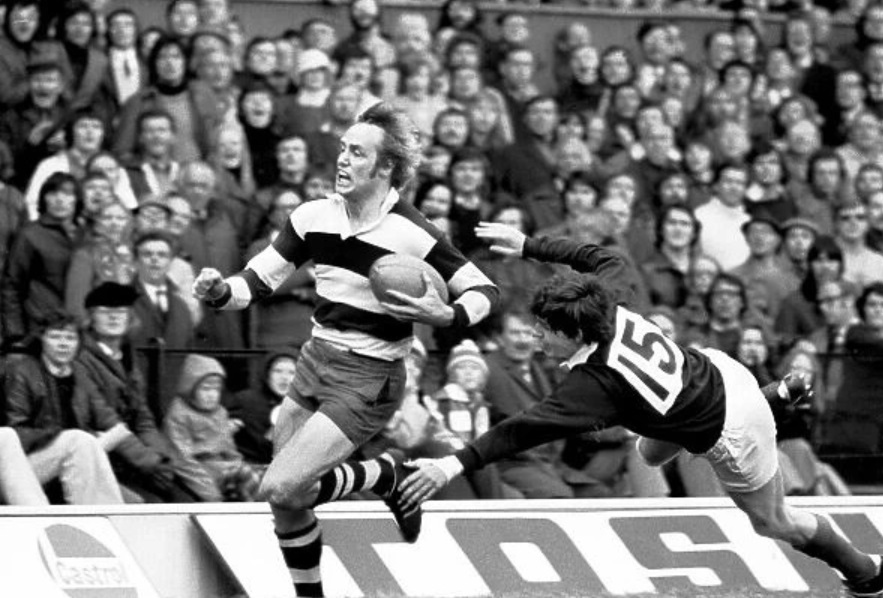
Stat Attack
This was Cov’s 53rd game of a season which brought 33 wins and four draws against opponents ranging from Guy’s Hospital, New Brighton, Exmouth and Roundhay to centenary year opponents the Barbarians, Leicester, Gloucester, Cardiff, Dublin Wanderers and Hawick.
No fewer than 55 players donned the famous blue-and-white hoops during the season, with centre Barrie Corless leading the way with 40 appearances. Top scorer was current club President Peter Rossborough who amassed 190 points in his 22 games.
Line-Ups:
Coventry: Rossborough; Duckham, Corless, Foulkes, Barnwell; Cowman, Gittings; Broderick, Gallagher, Fairbrother; Ninnes, Darnell; Walker, Cardwell, Robinson.
London Scottish: Stevenson; Keddie, Biggar, Friell, Fowlie; Bell, Crerar; Lovett, Pickering, Corstorphine; McHarg, Fraser; McKenzie, Thorburn, Biggar.
Referee: Mike Titcomb (Gloucestershire)
Scorers:
Coventry:
Tries: Duckham (2), Barnwell, Gittings
Conversions: Rossborough (2)
Penalties: Rossborough (2)
London Scottish:
Penalties: Bell (2)
Half-Time: Coventry 3-6 London Scottish
Attendance: 10,000
Coventry Evening Telegraph Man-of-the-Match: Alan Cowman
Looking Back
The Cov Tel’s preview advised that the absence of England’s Geoff Evans, who flew to South Africa with the British Lions nine days later, allowed future club captain Dave Foulks to make just his 17th appearance – and cup debut – at Twickenham.
Austin’s readers also discovered that the tight head prop selection had been “open for discussion” with future club coach Jim Robinson almost displacing Keith Fairbrother.
“The selectors have opted for experience and Fairbrother, currently on holiday in Spain, is included,” he wrote.
The CET’s main rugby man also told his readers: “Only eight of last year’s cup final side are on duty,” while his news update from the Exiles’ camp informed them: “Mike Biggar captains the Scots from the strong back row which also includes Ross McKenzie, a formidable New Zealander with a Scotland B cap.”
In his post-match Monday column Austin turned his gunsights on the RFU’s hardline interpretation of amateurism.
“In the continued absence of medals for the winning side the players doubly deserve tangible recognition in print,” he wrote, before going on to identify the contribution made by each player.
Within this Austin singles out the back row for: “Refusing to be submerged by their much-vaunted counterparts.
“Les Rolinson has scarcely played better…..Richard Walker supplied a determined physical effort and Robin Cardwell, injured last week, scavenged with skill after a precautionary pain-killing injection administered before kick off.”
Cardwell said he went into the match boosted by being invited to a pre-match dinner with legendary commentator Bill McLaren and his skipper.
“I was the new boy and Bill didn’t know too much about me so he took David Duckham and I out for dinner the night before the final,” he recalled.
“He went through my whole rugby pedigree – who I’d played for and everything about me – while we had a very pleasant meal.
“I’d never played at Twickenham and remember how antiquated it was with lots of big iron baths in the changing rooms.
“We had loads of self-belief in the side and David always told us ‘if everyone does their job we will win.”
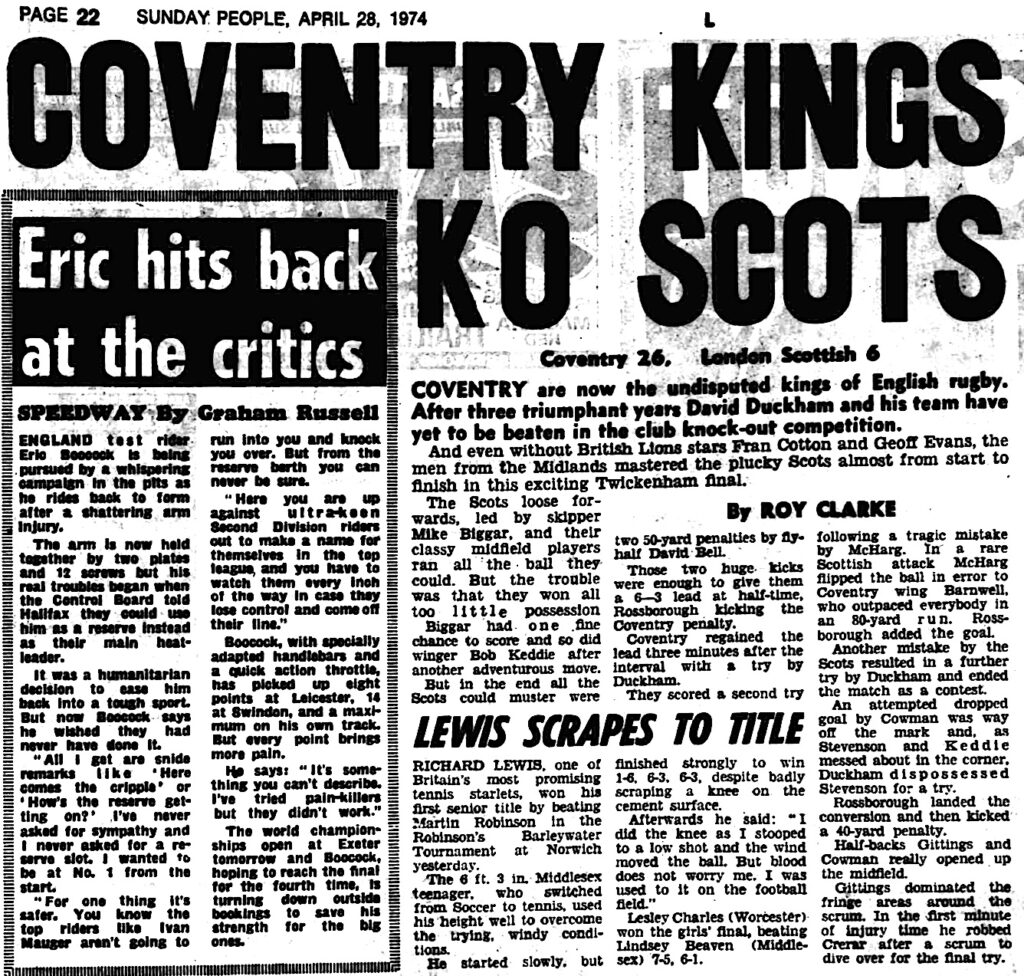
The Robin Cardwell Story
Cov’s former openside describes himself as “Belfast born and bred,” despite having no trace of an accent.
After studying engineering at Queen’s University where he won two rugby blues, Cardwell joined North of Ireland RFC where he played alongside legendary centre Mike Gibson.
After the IRA blew up a Courtaulds factory in Letterkenny in 1973 Cardwell was relocated by his employer to Coventry where Gibson’s Lions connection with Duckham paved the way for the 20-year-old back-rower to join the blue-and-whites.
However, as Cardwell recounts turning up with your boots and joining in training wasn’t an option, regardless of reputation.
“Colin Grimshaw the Irish international scrum half was already playing at Coundon Road and he said I should join but it wasn’t that straightforward.
“My introduction was therefore quite formal – a letter from Mike to David explaining who I was and saying he would support me playing for Coventry. Throughout my time with the club Mike kept in contact to check how I was doing.
“I had two games for the Extras and two for the Nighthawks in midweek. Cov then played Baa Baas in the centenary match and after John Barton got injured I got a phone call.
“I was told I was in the first team at no.8 – but refused saying: “I’m not a no.8 and I’ll do the club and myself no favours by playing there so if you don’t mind I’ll decline the invitation.
“I knew that if I cocked it up then I wouldn’t get another chance; thankfully 20 minutes later I got a call back saying ‘you’re on the flank’ as Rich Walker moved to no.8.”
“That was early in the season that ended with the cup final win and I stayed in the side at openside flanker.”
Cardwell went on to play 98 games for Cov before leaving the club in 1980 after the arrival of the likes of Paul Thomas and Mal Malik had made competition for back row places very testing.
“Approaching 30 I decided it was time for something different – Cov had a link with Kenilworth RFC so I captained them for a few years,” he said.
“I eventually had a bad leg break aged 33 and decided to close the book on rugby after being in plaster for five months.”
Cardwell is still involved with Kenilworth using skills gained during his long career with Land Rover as one of the project managers for their new ground.
He follows Cov from afar and enjoys attending the Cow Shed lunches.
Coventry Rugby’s 150 Legacy Club
The 150 Club is an elite season package, carefully curated to mark this historic event.
Membership gives priority access to the club’s celebratory events, a selection of exclusive, limited edition Coventry Rugby memorabilia and the chance to become part of club history, with your name etched on our 150-year commemorative plaque.
The 150 Legacy Club package includes:
A Limited Edition 150th Year Anniversary Coventry Rugby Club Shirt
A 150th Year Limited Edition Coventry Rugby Sekonda Watch
150th Year Commemorative Coventry Rugby Badge
Bottle of Anniversary Coventry Rugby Gin
2 x Tickets to Coventry Rugby’s End of Year Gala Dinner
Exclusive access to player Meet and Greet events
Your name engraved on Coventry Rugby Club’s 150 Year Anniversary Plaque
Information is available from ttrinder@coventryrugby.co.uk
With thanks to John Butler for statistical information and the Herbert Gallery’s Coventry Archive.
Next Time: November 1996: Coventry 19-18 Newcastle – The day 8000 packed Coundon Road to see Rob Andrew’s superstars depart in a huff.

